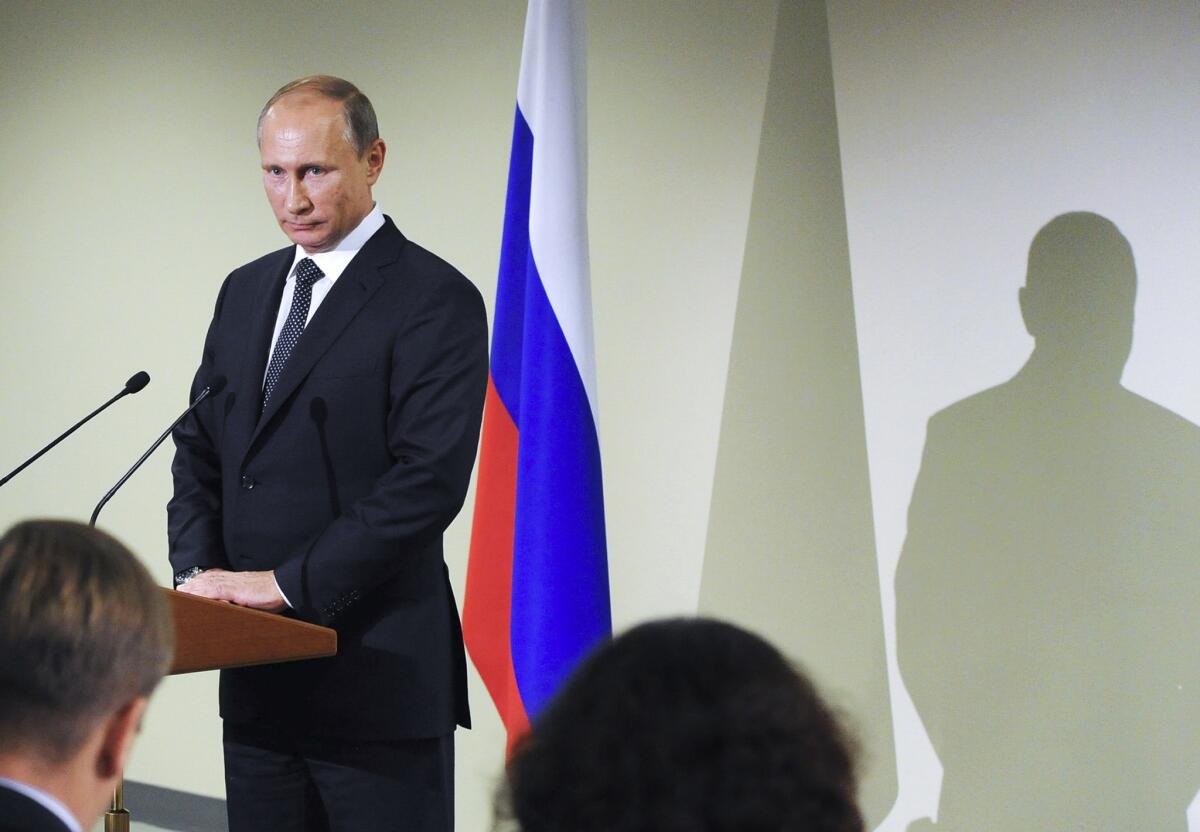Russian analysts cast Putin as rescuing Syria from Western bungling

Russian President Vladimir Putin’s address to the U.N. General Assembly and his meeting with President Obama on Monday were hailed by Russian media and commentators as an attempt to rescue Syrians from the security mess left by bungled Western intervention.
- Share via
Reporting from Moscow — To hear Kremlin spin doctors tell it, Russian President Vladimir Putin has valiantly stepped into the Syrian crisis to clean up the mess left by “illegal” U.S. and Western actions in support of rebels and extremist groups.
Russian media coverage and political commentary cast the Kremlin leader as being moved to intervene on behalf of peace and humanity. His proposals for a broad coalition to confront terrorism and his steadfast support for Syrian President Bashar Assad pose a viable alternative to U.S.-orchestrated airstrikes on Islamic State militants in Syria that have done little to contain the extremists, the pundits said.
In his Monday speech to the U.N. General Assembly, Putin made veiled reference to recent reports of U.S.-trained Syrian rebels defecting to Islamic State.
“We learned about the effectiveness of the actions of our American partners during the Pentagon report to the U.S. Senate,” Putin observed dryly. “To tell the truth, their effectiveness is low.”
Putin also called the airstrikes being waged by the United States, France, Turkey and other powers illegal interference in the sovereign affairs of Syria because they are carried out without the approval or coordination of Assad, a key Russian ally in the Middle East who Moscow continues to claim is Syria’s legitimate leader.
With Russia currently holding the rotating presidency of the U.N. Security Council, Putin said he would convene a special session on Wednesday to discuss how to coordinate political and military action in Syria to resolve the deadly crisis now in its fifth year. He also wants to get consensus on his envisioned international coalition to drive terrorists out of Syria, while minimizing the potential for Russian and Western aircraft to pose a threat of midair collision.
Russia this month deployed fighter jets, attack helicopters, tanks and naval forces to western Syria in a sudden buildup of its longtime presence there that alarmed U.S. intelligence and spurred fears that Moscow might be preparing to join Assad’s fight against rebel militias. Putin said in his speech that Russia has categorically ruled out deploying ground troops in Syria and called instead for coordinated operations aimed at eradicating Islamic State.
The Kremlin leader’s initiative had been widely touted in Russian media for weeks, yet his address to the General Assembly was met with fawning assessments by pro-Kremlin analysts in a barrage of commentaries Tuesday on the airwaves, social media and the blogosphere.
Under #PutinPeacemaker, journalists and commentators posted photos and cartoons on Twitter that variously depict Putin as a wrestler with President Obama in a headlock, crowned by a halo amid children’s fairy tale figures and single-handedly outweighing the combined leaders of Germany, France and the United States on a see-saw.
“Thanks president #Putin for your amazing job, people all over the world are grateful!,” declared one Twitter user under the handle @Russ-Warrior and illustrated by an image of the 19th century flag of Novorossiya, the now-Ukrainian territory coveted by pro-Russia separatists.
“Putin @ UNGA in short: US destabilized the world & created ISIS; EU tried secretly 2 cut off Ukraine from Russia. We should be allies again,” reads another tweet from an apparent Kremlin booster, using an acronym for Islamic State.
“He tried to open the eyes of the world and explain what the shortsighted policy of the United States could lead to” in Syria, Russia-1 television reporter Olga Skabeyeva asserted in her broadcast from New York.
Russia’s Tass news agency carried an interview with Syrian U.N. Ambassador Bashar Jaafari, who praised Putin’s exposure of “the hypocrisy of the Western policy towards Syria.”
“Putin is reading the map of the Middle East correctly, and he has the right analysis and categorization of what’s happening,” Jaafari told the state-run news agency. He said Putin called Islamic State “the making of the West designed in the laboratories of Western intelligence.”
Political commentators were unabashed in their praise for Putin’s address and his 90-minute one-on-one meeting with Obama on the sidelines of the General Assembly after both leaders spoke. They portrayed the Russian president as having found a way to break the East-West stalemate that Russian media blame on U.S. and European sanctions, not on the Kremlin’s annexation of Ukraine’s Crimea territory that spurred the blacklists and trade restrictions.
“It’s a message to all of humanity: Russia in its speech gave its vision of key international issues and offered ways to solve them,” effused Igor Korotchenko, editor of the National Defense magazine, in a televised post-mortem on Putin’s speech.
Some analysts have alluded to comments by Obama and other Western leaders hinting at possible easing of their longstanding opposition to Assad playing any role in an envisioned peace process. But most ignored what remains the greatest obstacle to negotiating a settlement of the Syrian conflict: Western governments’ accusations that Assad is a war criminal and has nothing to contribute to the pursuit of peace in his country.
Follow @cjwilliamslat for the latest international news 24/7
More to Read
Sign up for Essential California
The most important California stories and recommendations in your inbox every morning.
You may occasionally receive promotional content from the Los Angeles Times.











